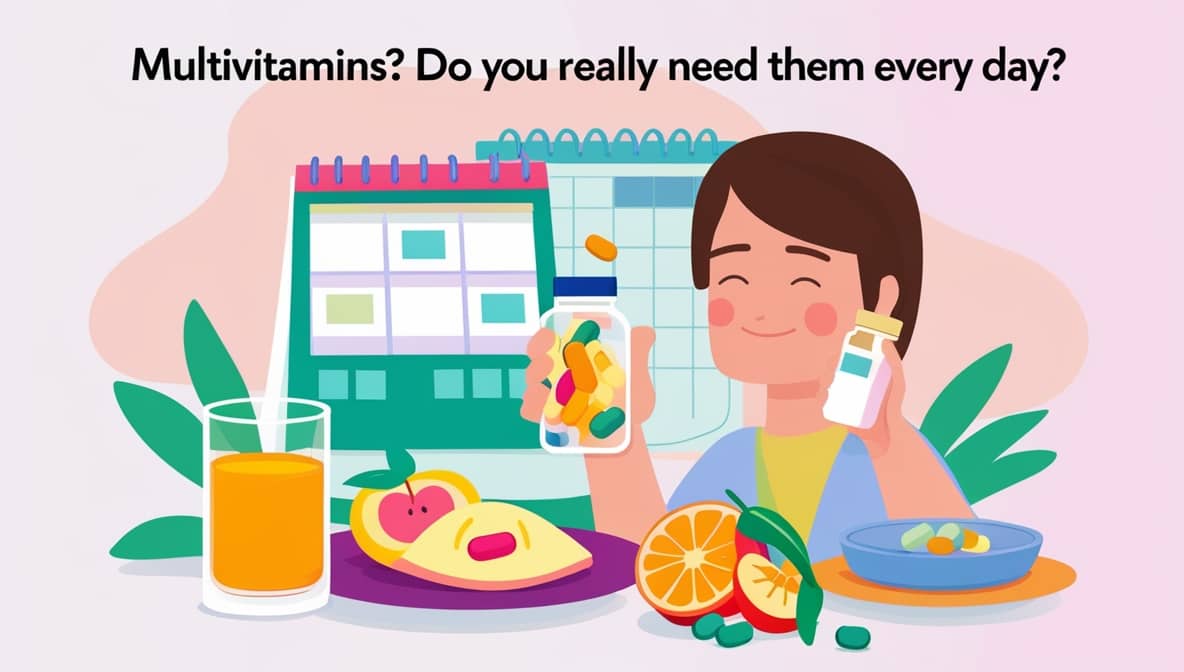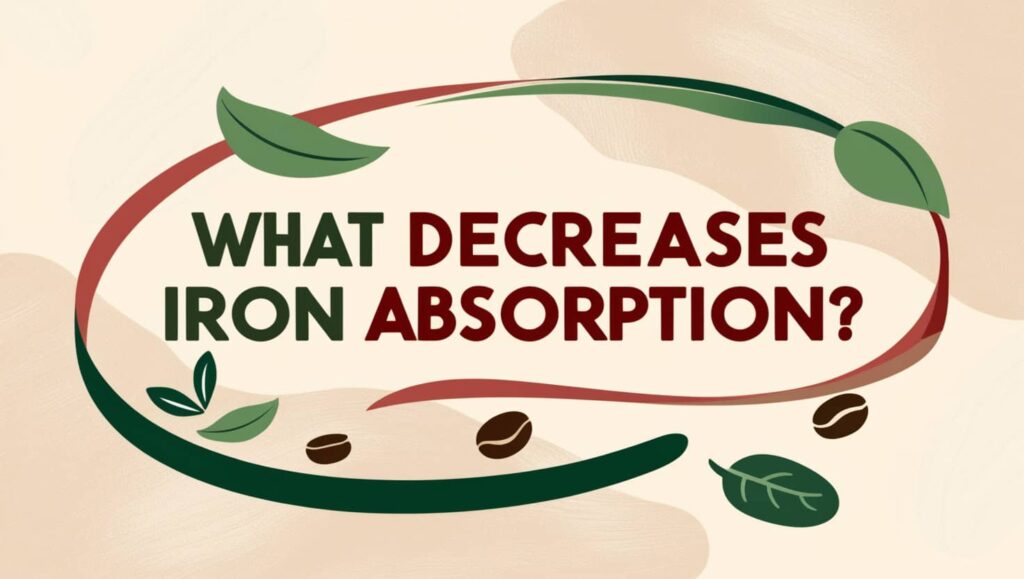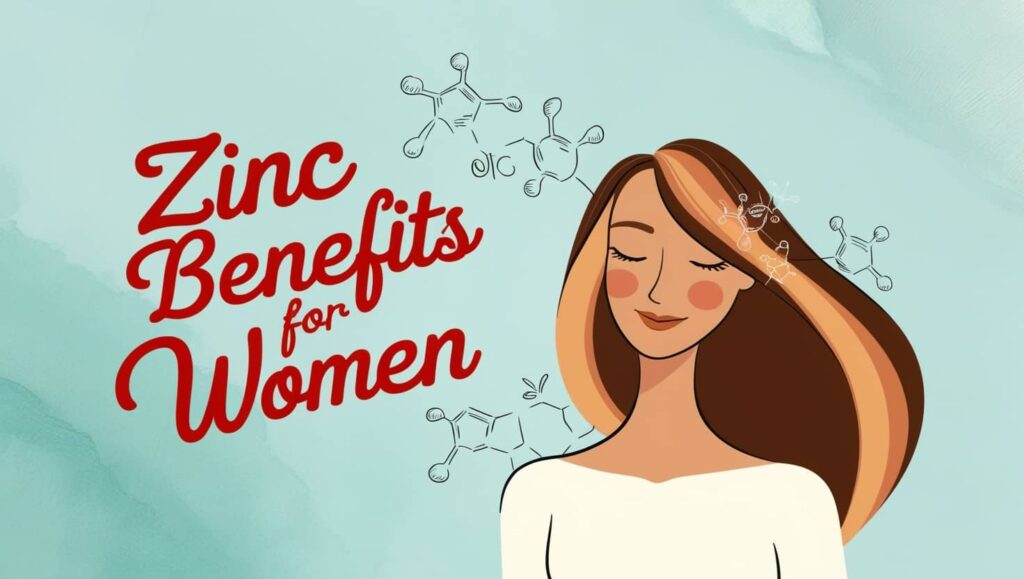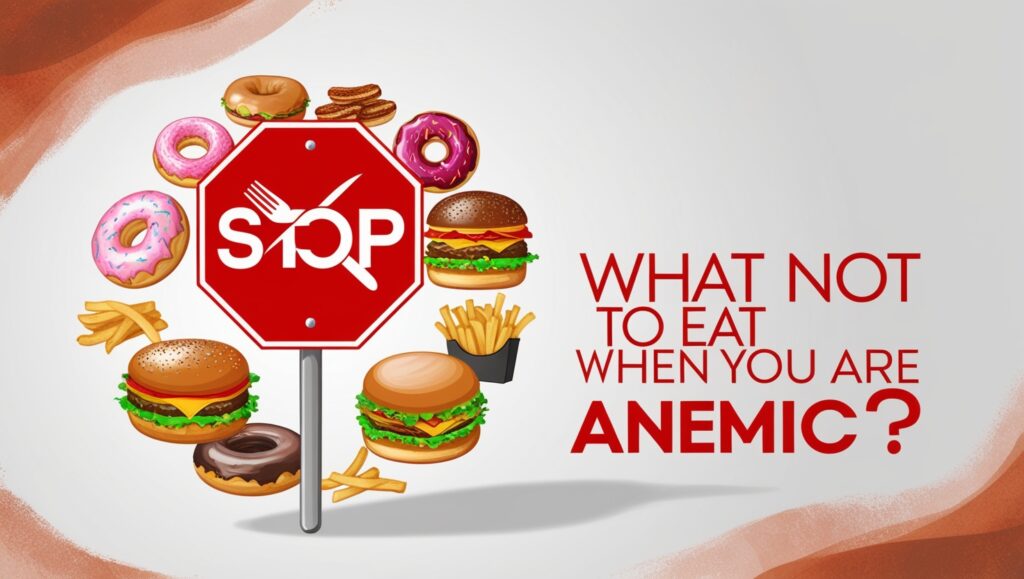Vitamins are organic compounds essential for the body’s metabolism, growth, and proper development. Because the body often doesn’t produce them in sufficient quantities, obtaining them regularly from food sources becomes essential.
The modern diets followed by many today may not meet their full nutritional requirements for these essential elements, leading to vitamin or mineral deficiencies and associated health problems. To fill this gap, many people turn to multivitamin supplements, which provide a combination of essential vitamins and minerals.
This is what we will discuss in detail in the following paragraphs.
What’s Inside a Multivitamin Supplement
Multivitamins contain a combination of vitamins and minerals essential for proper body function, often equal to or close to the recommended dietary allowance (RDA) or daily value (DV) for many nutrients.
The exact ingredients vary greatly among brands and formulations. For example, there are formulas designed for men, athletes, women, pregnant women, children, and the elderly. The most common ingredients can be categorized into:
A. Vitamins
They fall into two main categories:
-
Fat-soluble vitamins, which are stored in the body, such as:
-
- Vitamin A (often as beta-carotene)
- Vitamin D (usually D2 or D3)
- Vitamin E
- Vitamin K
-
Water-soluble vitamins, which are not stored well and are excreted by the body in excess, such as:
-
- Vitamin C
- B-complex vitamins:
- Thiamin (B1)
- Riboflavin (B2)
- Niacin (B3)
- Pantothenic acid (B5)
- Pyridoxine (B6)
- Biotin (B7)
- Folic acid (B9, often as folic acid)
- Cobalamin (B12)
B. Minerals
-
Key minerals
-
- Calcium (rarely contains 100% of the daily value due to the tablet size)
- Magnesium
- Potassium (often also found in small doses) Minor amounts
- Phosphorus
-
Trace minerals
-
- Iron (men’s formulas often contain lower or no amounts; women’s and prenatal formulas typically contain higher amounts).
- Zinc
- Iodine
- Selenium
- Copper
- Manganese
- Chromium
- Molybdenum
C. Other ingredients
Many multivitamins also contain non-vitamin and non-mineral ingredients, such as:
- Antioxidants, such as lutein and lycopene.
- Botanical/herbal extracts: such as ginseng, green tea extract, or ginkgo biloba, especially in formulas designed for specific health goals (e.g., energy, immunity, etc.).
- Amino acids
- Fatty acids (e.g., omega-3)
- Excipients: Binders, fillers, colors, and flavors (especially in gummies or chewable tablets). (National Institutes of Health (NIH), 2024)
It’s always best to check the “Supplement Facts” section on the package of the multivitamin you’re purchasing for exact contents and amounts.
Multivitamin Benefits and Common Myths
Multivitamins are often surrounded by a wealth of misinformation, sometimes exaggerating their benefits or warning of various risks. Together, we’ll shed light on the scientific benefits and potential risks of multivitamins.
Multivitamins Benefits
Multivitamins are nutritional supplements that contain a range of vitamins and minerals the body needs to perform its vital functions. They are extremely important in treating and supporting certain health conditions, as they can:
Compensate for Nutritional Deficiencies
They are used to prevent and treat low vitamin and mineral levels in people who suffer from malnutrition, malabsorption, or follow an unbalanced diet, such as vegetarians who need vitamin B12.
Support Essential Body Functions
Vitamins and minerals play a vital role in:
- Supporting the body’s immunity, they help fight infections and improve the immune response.
- Promoting bone health, such as calcium and vitamin D.
- Nerve and brain health, such as B vitamins.
- Blood support, such as iron, folic acid, and vitamin B12, to combat anemia caused by malnutrition.
- Maintaining healthy skin, hair, and nails.
Related — Iron Rich Foods | Everything About Iron
Supporting Specific Groups
- Pregnant and breastfeeding women: Ensures that the mother and fetus/infant receive adequate amounts of essential nutrients, such as folic acid and iron.
- Older adults: The body’s absorption of some vitamins, such as B12, is impaired with age, and these individuals may need more vitamin D and calcium.
- Surgery recovery: To aid tissue healing and recovery.
Multivitamin Common Myths
Here are the most common myths about multivitamins and the scientific truth, plus tips to ensure you get the most benefit.
- Myth: Taking a daily multivitamin ensures excellent health and prevents all chronic diseases.
- Fact: There is no conclusive scientific evidence that multivitamins improve the health of healthy people who eat a balanced diet, or that they significantly reduce the risk of chronic diseases.
To maintain overall health, nutrients must be obtained from a healthy, balanced diet rich in fruits, vegetables, and whole grains. Supplements are simply nutritional supplements, not a substitute for food.
- Myth: Taking too much of a vitamin is safe; the body automatically eliminates excess amounts.
- Fact: Water-soluble vitamins, such as vitamin C and the B vitamins, are normally excreted in urine, while fat-soluble vitamins such as A, D, E, and K are stored in the body.
Excessive intake over a long period of time can lead to toxic levels, liver and nerve damage, or other serious health problems.
- Myth: Expensive multivitamins are necessarily better.
- Fact: A high price doesn’t always reflect the product’s quality or effectiveness. It’s important to review the ingredients and dosages to ensure they provide the recommended amounts and don’t contain excess or unnecessary ingredients.
- Myth: Multivitamins always interfere with other medications.
- Fact: Some vitamins and minerals may interact with certain medications. For example, they may affect the absorption of certain antibiotics or thyroid medications, or increase the risk of bleeding with blood thinners.
Always consult your doctor or pharmacist before taking any nutritional supplements if you are taking other medications.

Best Multivitamins for Men and Women
Selecting the right multivitamin means considering gender and age-specific nutritional requirements.
Most high-quality multivitamins provide recommended levels of essential vitamins and minerals, but specific formulations are adjusted to address differing daily needs. National Institutes of Health (NIH), 2022
Key Nutritional Differences
| Group | Specific Needs | Typical Multivitamin Adjustment |
| Premenopausal Women | Higher needs for iron (due to menstruation) and folic acid (crucial for fetal development if pregnant). | Formulas generally contain higher levels of Iron and Folic Acid. |
| Men | Generally, have sufficient iron intake from diet. | Formulas typically contain lower levels of Iron. |
| Older Adults (Both Sexes) | Increased risk of bone density loss. | May need higher levels of Calcium and Vitamin D |
Important Considerations
| Factor | What to Look For |
| Age and Gender | Ensure the formula aligns with your life stage (e.g., premenopausal women vs. men over 50). |
| Active Lifestyle | Athletes should choose multivitamins NSF Certified for Sport to guarantee they are free from banned substances and contaminants. |
| Ingredient Form | Prioritize products with highly bioavailable nutrient forms, such as Vitamin D3 (cholecalciferol) and natural Vitamin E (d-alpha tocopherol), for better absorption. |
For Women
| Product | Key Features |
| Ritual Essential for Women 18+ | Focuses on bioavailable and high-quality forms of key nutrients to support energy, skin, and nail health. |
| Nature Made Multi for Her | A reliable, budget-friendly option providing 23 important nutrients. It is third-party tested by the USP. |
| OLLY Women’s Multivitamins | A popular, chewable gummy that contains essential vitamins (A, D, C, E), biotin, and folic acid. |
| Mary Ruth Organics, Liquid Multivitamin for Hair Growth | A liquid supplement often marketed for women’s hair, skin, and nail health, featuring a focus on biotin. |
For Men
| Product | Key Features |
| Thorne, Essential Nutrients, 2 Servings Daily | A top-tier choice, often NSF Certified for Sport, making it great for active individuals and athletes. |
| Ritual Essential for Men 18+ | Similar to the women’s version, this focuses on providing bioavailable forms of core nutrients. |
| Men’s Daily Multivitamin (Generic) | A widely available, affordable option that includes Vitamin D, zinc, folic acid, and B vitamins to support physical energy. |
| Healthline’s Top Picks | Often include high-quality brands like Thorne, Ritual, Mega Foods, and Pure Encapsulations, frequently featuring specific formulas for different age groups. |
Risks of Taking Too Many Multivitamins
You will not get the multivitamins’ benefits by taking more than you need.
The main risks of excessive vitamin intake arise from how the body processes different types of vitamins:
The risk of toxic accumulation of fat-soluble vitamins: Vitamins K, E, D, and A.
Mechanism: Unlike water-soluble vitamins (which are usually excreted in urine), fat-soluble vitamins are stored in body tissues. This makes it easier for dangerous levels to build up when large amounts of supplements are taken. Yale New Haven Health, 2018
Common Symptoms of Vitamin Toxicity
Excessive intake of fat-soluble vitamins can cause a wide range of symptoms, including, but not limited to:
- Nausea or vomiting, diarrhea, and stomach cramps.
- Fatigue, dizziness, bone pain, and excessive thirst.
- Skin redness and irritation, peeling or itching, and hair loss.
- Poor muscle coordination, kidney stones, irregular menstrual periods (in women), and bleeding.
Long-Term Health Consequences
In severe cases, vitamin toxicity can lead to serious and long-term health complications, such as:
- Osteoporosis
- Heart problems
- Liver damage
- Neurological problems
- Stroke
- Birth defects (in pregnant women)
- Coma or even death.
Special Warning: Studies suggest that high doses of some vitamins may increase the risk of lung cancer in smokers.
Risk of overdose (unintentional poisoning)
Fortified foods: Many modern foods are fortified with essential vitamins and minerals. Taking supplements without checking your needs can easily lead to exceeding safe limits.
“Single” supplements: Some foods contain surprisingly high amounts of minerals; for example, just six Brazil nuts contain 780% of the recommended daily amount of selenium.
Tips to Avoid Vitamin Toxicity
If you want to get Multivitamins benefits safely, you should do the following:
Consult Your Doctor First: Talk to your doctor about your individual needs based on your age, health, and activity level.
Drug Interactions: Discuss any medications you take regularly, as some may interact with nutritional supplements and increase the risk of toxicity.
Safe Dosage: Always follow the directions on product labels and know the maximum limits for the vitamins and minerals you take.
Diet Priority: Obtaining adequate amounts of vitamins naturally through a varied diet is less likely to cause toxicity than excessive doses of nutritional supplements.
References
- National Institutes of Health (NIH). (2022). Retrieved from Multivitamins—do you need one? And which one should you choose?
- National Institutes of Health (NIH). (2024). Retrieved from Multivitamin/mineral Supplements
- Yale New Haven Health. (2018). Retrieved from Can Taking Too Many Vitamins be Harmful?







